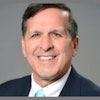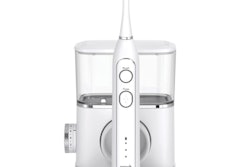
Oral health practitioners are seeing a wider range of medically complex patients, so when planning treatments they need to consider patients' overall health and not just that of their teeth and mouth, according to a presentation on May 5 at the California Dental Association's CDA Presents 2017 meeting in Anaheim, CA.
"Let's put the patient into the discussion, not just the teeth or the restorative material we're going to use," said Anders Nattestad, DDS, PhD, a professor in the department of oral and maxillofacial surgery at the University of the Pacific's Arthur A. Dugoni School of Dentistry in San Francisco.
Art and science
As recently as 15 years ago, dentists did not see as many medically complex patients as they do today, Dr. Nattestad noted. People are living longer for many reasons, such as improvement in surgical techniques, more effective pharmaceuticals, and patients taking better care of themselves, he added.
"It is good that we have these benefits, but it does make life a little more complicated for dentists," he said.
When it comes to medically complex patients, Dr. Nattestad stated that it is his experience that dentists are likely more knowledgeable about medical issues than they give themselves credit for.
"I will argue until the day I die that you, as a dentist, know more about medicine than a physician knows about oral health," he said. "They have no idea what it means to remove a tooth or how long it takes for a body to heal afterward."
He then detailed his approach, which is to take a thorough patient history with each patient.
"You ask a 15-year-old about their medical history and that might be a quick conversation," Dr. Nattestad said. "But ask a 70-year-old -- that might take a while. You need to be prepared for that."
His approach to this conversation is to break complicated conditions into smaller pieces.
"I take it one disease and one drug at a time," Dr. Nattestad said. "It helps to break it down into small components."
It is more important for the dentist to identify the patient's chief complaint first and then oral health issues later in the conversation, he noted.
"You can go back to the tooth later. Find out their major health problem first," Dr. Nattestad told the attendees.
He noted that he makes sure to include questions about allergies, medications, surgeries, and even social use of drugs.
Pharmaceutical category
Dr. Nattestad then spoke about some specific pharmaceutical categories in his medical history discussion.
"I want to know what kind of drug it is -- that's what you need to know," he said. "I care about the category, not the sales name."
He displayed a list of the 30 most prescribed pharmaceuticals in the U.S., noting that four of the top 10 drugs on the list are selective serotonin reuptake inhibitors (SSRIs). These pharmaceuticals are typically used as antidepressants.
"There are so many different SSRIs that it is difficult to keep up," he said. "The good news is that usually [this category of pharmaceuticals] aren't clinically relevant in your treatment."
He then briefly talked about pain management and opioid abuse.
"I have a huge issue with opioid abuse in this country. Why are opioids available here when they aren't available in other countries I have practiced in?" he asked. "We have to get these drugs tossed."
He noted that for postsurgical pain, he'll recommend ibuprofen.
"I try to remind my patients that they just had surgery, and it's supposed to hurt," he said, which drew an appreciative laugh from the audience.
Medical and disease history
An important aspect of a patient's history is asking about the medical and disease history. Dr. Nattestad focused on conditions such as hypertension and diabetes in his presentation.
“You'll save two or three people's lives a year if you screen for hypertension and tell them to see a physician.”
He spent time walking the audience through the process of taking a patient's blood pressure and reminding them that 1 in 6 people have undiagnosed hypertension.
"You'll save two or three people's lives a year if you screen for hypertension and tell them to see a physician," he said.
Dr. Nattestad walked the attendees through the different types of diabetes and what some of the terms associated with the condition mean, such as HbA1c and blood glucose.
Dentists should measure patients' blood glucose levels, or lend their device to the patients so they take their own, he recommended. These devices can be purchased online for between $10 and $70, he noted.
When treating patients with either type of diabetes, Dr. Nattestad generally makes some treatment plan modifications:
- Schedules morning appointments.
- Advises normal medications and diet for patients before treatment.
- Limits treatment duration.
- Considers if antibiotic coverage is necessary.
- Issues post-op diet instructions.
- Admits the patient to the hospital for larger surgeries.
- Consults with a physician.
When to postpone treatment
An audience member asked when a dentist should consider postponing elective treatment because of a patient's medical condition. Dr. Nattestad responded that he postpones treatment in patients with the following conditions:
- Heart attack (known as an acute myocardial infarction or AMI) in the last few months
- Stroke in the last few months
- Uncontrolled diabetes
- Blood pressure above 180/110 based on individual assessment
- Undiagnosed and untreated chest pains
He related a story of a patient who came to him for dental work when the patient had experienced multiple recent strokes and told Dr. Nattestad that he was going back into the hospital as soon as he recovered from an illness. However, it took Dr. Nattestad some time to convince the patient that having dental treatment wasn't appropriate at that time and that he'd be happy to treat him when the patient had recovered.
A member of the audience then asked if Dr. Nattestad had been concerned about a potential lawsuit from deciding not to treat this patient.
"When you make a decision based on science, you'll never be accused of abandoning a patient," he replied.



















